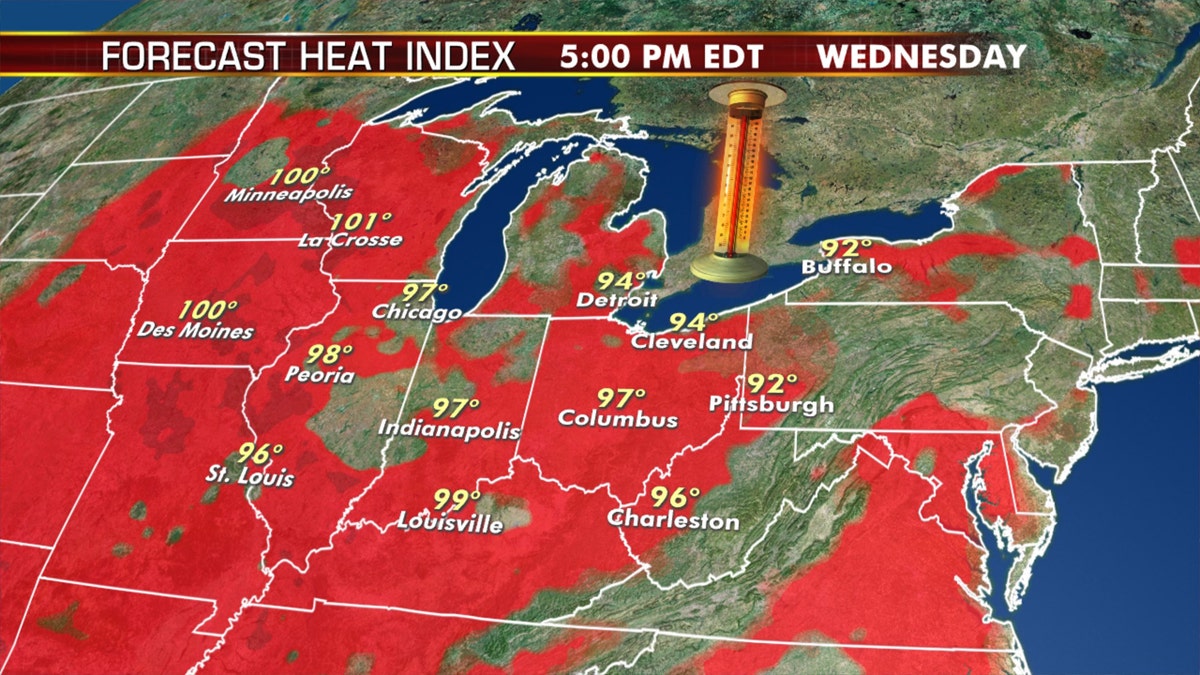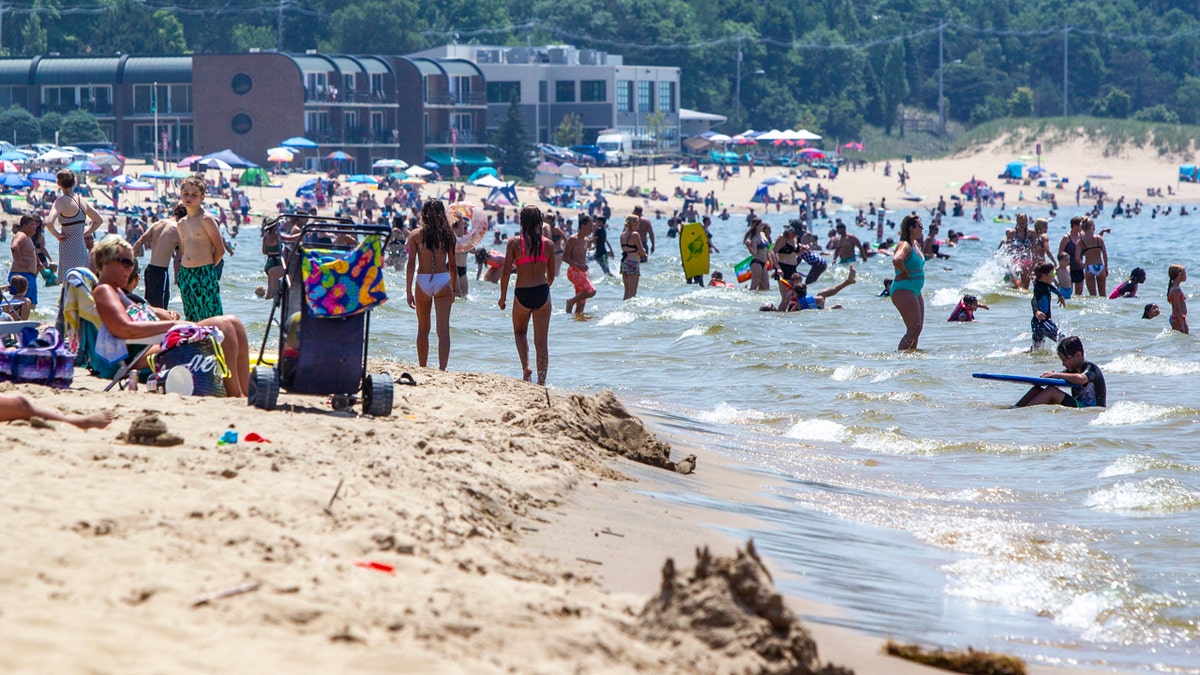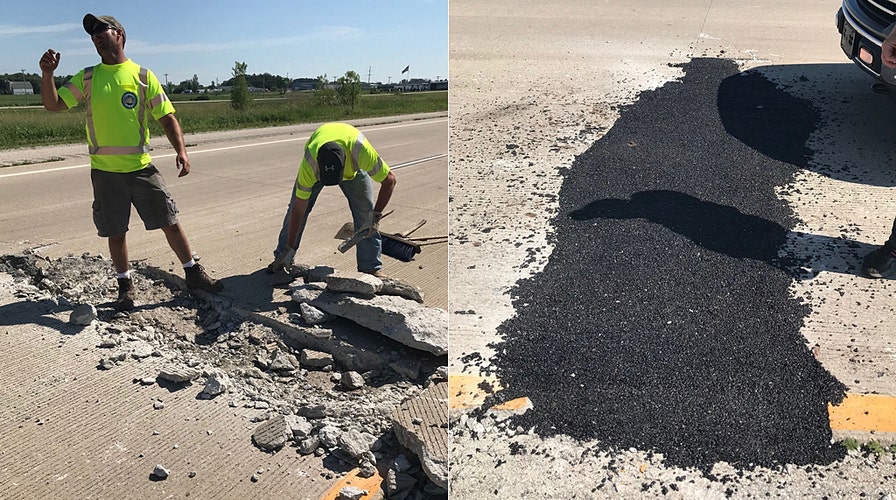National forecast for Wednesday, July 8
Fox News senior meteorologist Janice Dean has your FoxCast.
A heat wave that's gripped the Midwest for days and will only grow more intense by next week is taking its toll on roads across the region, creating hazards for motorists.
The National Weather Service's (NWS) Weather Prediction Center (WPC) said that temperatures in a warm air mass over the Midwest will climb into the 80s and low 90s on Wednesday from the Corn Belt eastward to the central Appalachians.
"Summertime heat is the big story for much of the country," Fox News' senior meteorologist Janice Dean said Wednesday. "We have heat indices forecast to be in the 90 to 100 degrees range for parts of the Midwest stretching into the Northeast and Great Lakes tomorrow."
HEAT WAVES HAVE BECOME MORE FREQUENT AND INTENSE IN MOST OF THE WORLD SINCE 1950S: STUDY
The combination of prolonged intense heat and humidity has added stress on highways and local roads across the region.

Dozens of roads have buckled in Wisconsin and Illinois as a heat wave and high humidity have created conditions for pavement buckling. (Wisconsin Department of Transportation)
The Illinois Department of Transportation warned motorists on Monday to watch for damaged roadways that may buckle during this intense stretch of heat.
“One of the hottest weeks of the year means the potential for pavement failures will increase,” said Omer Osman, acting transportation secretary. “At IDOT, we have the necessary staffing and materials in place to make repairs as quickly as possible."
The land of Lincoln is broiling with temperatures in the 90s, from Chicago to Cairo, and a forecast heat index approaching 100 degrees across much of the state. Several roads in the Peoria area buckled on Tuesday, WMBD-TV reported.

The forecast heat index for Wednesday across the Midwest. (Fox News)
Transportation officials said that pavement failures, or blowouts, occur when prolonged high temperatures cause the road to expand and buckle up or blow out, resulting in uneven driving surfaces.
Any precipitation and humidity increase the potential for buckling.
“We ask the public to stay alert and avoid driving over buckled roads, if possible, while giving our crews plenty of room to work,” Osman said Monday.
In neighboring Wisconsin, the state DOT said at least 25 road buckles have happened since Saturday.

Dozens of roads have buckled in Wisconsin and Illinois as a heat wave and high humidity have created conditions for pavement buckling. (Wisconsin Department of Transportation)
“It is a statewide issue that we’re seeing an uptick in buckling,” Wisconsin DOT Materials Management Chief Barry Paye told Spectrum News. “Our maintenance crews with our county highway maintenance department have been doing a lot of work these past couple days to keep up.”
Heat to stick around, get more intense

Beach-goers fill Grand Haven State Park and City Beach on Tuesday, July 7, 2020. Michigan has been in a 90-degree plus heat wave for several days. (Cory Morse/The Grand Rapids Press via AP)
The hot weather across the Midwest is only going to stick around and get more intense in the days ahead.
The NWS Climate Prediction Center (CPC) said there's a high risk of excessive heat across parts of the Great Plains and Mississippi Valley are likely by the weekend, with temperatures feeling like between 105 and 110 degrees.
Next week, Wisconsin could be battling it out with the Southeast for the nation's hottest feels-like temperature — which factors in humidity — with heat indices pushing past 100, CPC meteorologist Matthew Rosencrans told the Associated Press.
CLICK HERE FOR MORE WEATHER COVERAGE FROM FOX NEWS
A giant ridge of high pressure, parking hot air, is stuck in the Southwest and extends farther east than usual, blocking cold fronts from moving in, according to Rosencrans.

Heat advisories stretch across the Midwest into the Great Lakes on Wednesday. (Fox News)
The jet stream, a river of air that keeps weather moving, has retreated to Canada, so nothing is pushing the heat along. On top of that, dry weather feeds the heat in a “vicious feedback cycle,” he said.
Jeff Masters, founder of Weather Underground and now a meteorologist at Yale Climate Connections, said "very widespread" heat this month is going to be "very long-lasting."
CLICK HERE FOR THE FOX NEWS APP
“It’s not a record-breaking heat wave, but it is notable for its persistence," he told the AP.

Beach-goers fill Grand Haven State Park and City Beach on Tuesday, July 7, 2020. Michigan has been in a 90-degree plus heat wave for several days. (Cory Morse/The Grand Rapids Press via AP)
Meteorologists warn this is a dangerous type of heat where people need to be careful about heat stroke, stay indoors and drink plenty of water.
The Associated Press contributed to this report.

